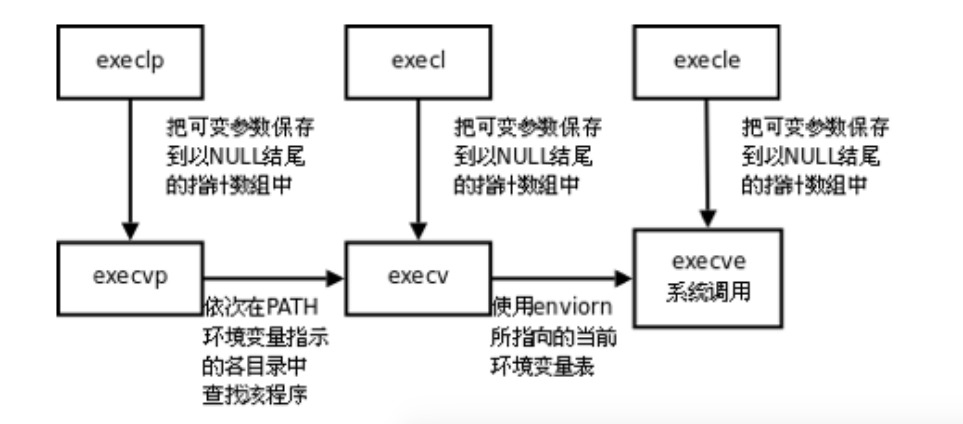进程程序替换
用fork创建子进程后执行的是和父进程相同的程序(但有可能执行不同的代码分支),子进程往要调用一种exec函数以执行另一个程序。当进程调用一种exec函数时,该进程的用户空间代码和数据完全被新程序替换(也仅仅替换代码和数据,其它不变),从新程序的启动例程开始执行。调用exec并不创建新进程,所以调用exec前后该进程的id并未改变。
函数原型
其实有六种以exec开头的函数,统称exec函数:
前5中为C库函数,在man 2 号手册中:
最后一种为系统调用,在3号手册中:
前5种库函数的实现都是封装了最后的系统调用。如图:
这些函数如果调用成功则加载新的程序从启动代码开始执行,不再返回,如果调用出错则返回-1, 所以exec函数只有出错的返回值而没有成功的返回值。
这些函数原型看起来很容易混,但只要掌握了规律就很好记。
不带字母p (表示示path)的exec函数 第一个参数必须是程序的相对路径或绝对路径,例如"/bin/ls"或"./a.out",而不能是"ls"或"a.out"。对于带字母p的函数: 如果参数中包含/,则将其视为路径名。 否则视为不带路径的程序名,在PATH环境变量的目录列表中搜索这个程序。
带有字母l( 表示示list)的exec函数要求将新程序的每个命令行参数都当作一个参数传给它,命令行参数的个数是可变的,因此函数原型中有...,...中的最后一个可变参数应该是NULL, 起sentinel的作用用。
带有字母v( 表示示vector)的函数,则应该先构造一个指向各参数的指针数组,然后将该数组的首地址当作参数传给它,数组中的最后一个指针也应该是NULL,就main函数的argv参数或者环境变量表一样。
对于以e (表示示environment)结尾的exec函数,可以把一份新的环境变量表传给它,其他exec函数仍使用当前的环境变量表执行新程序。示例代码:
execl:
运行结果:#include <stdio.h> #include <unistd.h> #include <sys/types.h> #include <sys/wait.h> int main() { pid_t id = fork(); if (id < 0) { perror("fork"); return 1; } else if (id == 0) // child { printf("child exec ...\n"); execl("/bin/ls", "ls", "-l", NULL); printf("exec error\n"); } else // father { printf("father wait ...\n"); int ret = waitpid(id, NULL, 0); if (ret < 0) { perror("wait"); return 2; } else { printf("wait %d success...\n", ret); } } return 0; }
execv:
#include <stdio.h> #include <unistd.h> #include <sys/types.h> #include <sys/wait.h> int main() { pid_t id = fork(); if (id < 0) { perror("fork"); return 1; } else if (id == 0) // child { printf("child exec ...\n"); char * const argv[] = { "ls", "-l", NULL }; execv("/bin/ls", argv); printf("exec error\n"); } else // father { printf("father wait ...\n"); int ret = waitpid(id, NULL, 0); if (ret < 0) { perror("wait"); return 2; } else { printf("wait %d success...\n", ret); } } return 0; }
运行结果:
execve:
#include <stdio.h> #include <unistd.h> #include <sys/types.h> #include <sys/wait.h> int main() { pid_t id = fork(); if (id < 0) { perror("fork"); return 1; } else if (id == 0) // child { printf("child exec ...\n"); char * const argv[] = { "ls", "-l", NULL }; char * const envp[] = { "/bin" }; execve("/bin/ls", argv, envp); printf("exec error\n"); } else // father { printf("father wait ...\n"); int ret = waitpid(id, NULL, 0); if (ret < 0) { perror("wait"); return 2; } else { printf("wait %d success...\n", ret); } } return 0; }
运行结果:
其它三个函数类似,不在演示。
进程程序替换
最新推荐文章于 2022-09-22 23:48:17 发布






























 1022
1022











 被折叠的 条评论
为什么被折叠?
被折叠的 条评论
为什么被折叠?










